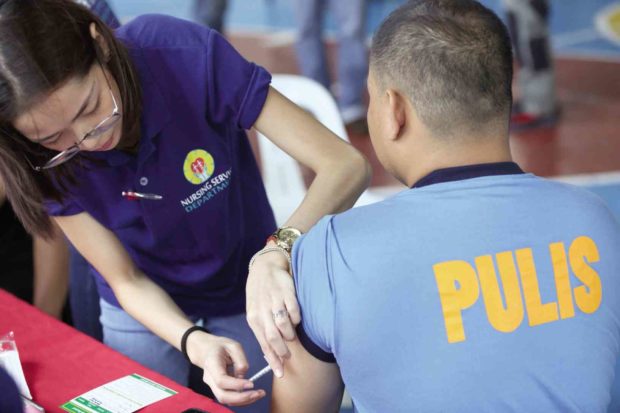
Over 1,200 Quezon City policemen and their dependents got free dengue shots in September. Just how much it will cost them in the long run has yet to be known. —NIÑO JESUS ORBETA
Students were not the only recipients of the world’s first dengue vaccine whose safety is now in question after its manufacturer admitted that it poses possible severe risks to people who have yet to be exposed to the disease.
In September, 1,257 Quezon City policemen and their dependents were given Dengvaxia under the Quezon City Police District’s free vaccination program.
Following Sanofi Pasteur’s announcement, the head of the QCPD Health Service assured those who were immunized against dengue that there was nothing for them to worry about.
Chief Insp. Josephine Nandu said that the Philippine Children’s Medical Center (PCMC) led by its chief, Dr. Julius Lecciones, with whom the QCPD had coordinated on the immunization program, would help any of the recipients who show symptoms of the disease.
The Quezon City hospital, one of several tasked to implement the vaccination program, had procured 600,000 vials (equivalent to three million doses) of Dengvaxia.
Nandu recalled that a QCPD personnel had informed her of the program at PCMC and suggested that it would benefit members of the police force and their dependents.
Vaccines set to expire
“A vaccination then would cost around P5,000,” she told the Inquirer on Saturday. “Instead of the vaccines [going to waste]—since we were told they were set to expire—why not just give it to our dependents?”
The QCPD, however, was unable to provide details on how many of its personnel and dependents had received the free vaccine since PCMC, which was in charge of the three-day immunization drive, was in possession of the list of recipients’ names.
Still, Nandu said that those who were vaccinated represented just a small portion of the city’s police force which is 5,000 strong.
In line with the Department of Health’s suspension of the immunization drive, the administration of the second dose scheduled in February would be put on hold, she added.
“Along with PCMC, we will recall those who had received [the] vaccine and they [will] be placed under intensified monitoring,” Nandu said.
As the risk for dengue infection may be higher for children between 9 and 16 years old, Nandu said the policemen’s dependents in that age range might be given ID cards that may be used at PCMC should they come down with dengue symptoms.
She added that Lecciones had assured her that “anytime [those who received the vaccine] show symptoms or they want to be assured that their dependents who received the vaccine would be safe,” they would be accommodated at the hospital.
Nandu noted, however, that since September, no one has been diagnosed with dengue among QCPD personnel.
“But if they have any concerns, they should just coordinate with the District Health Service and we will bring their concerns to the PCMC,” she said.